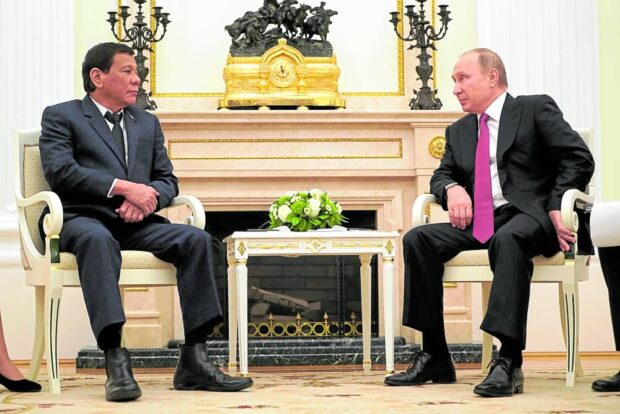
THOSE WERE THE DAYS | Former President Rodrigo Duterte once called Russian President Vladimir Putin “a personal friend.” They meet here at the Kremlin during the Philippine leader’s visit to Moscow on May 23, 2017. (MALACAÑANG FILE PHOTO)
MANILA, Philippines — Sen. Ronald “Bato” dela Rosa is not worried about the consequences for him and former President Rodrigo Duterte of a decision by the International Criminal Court (ICC) to order the arrest of Russia’s President Vladimir Putin for war crimes in Ukraine.
Duterte and Dela Rosa, his first national police chief who implemented the “tokhang” antidrug campaign that led to thousands of deaths, are facing charges of crimes against humanity in the ICC that were filed by families of the victims.
Dela Rosa on Saturday said that the ICC would be unable to implement the arrest of Putin and was confident that neither could it do the same to him and Duterte.
Escalation
“We have no control over the ICC if they decide to issue an arrest warrant, but the (Philippine National Police) or the (National Bureau of Investigation) can just say ‘We are not bound by your decision,’” he said.
Dela Rosa repeated an earlier statement that he was willing to face trial in the Philippines before a judicial body composed of Filipinos and “free from interference from outsiders.”
He warned that any external force that will seek to carry out Putin’s arrest might escalate into another armed conflict in the same way that Philippine security forces would also not allow the entry of the ICC into the country without the government’s assent.
“So, who will make the arrest? If other forces of another nationality will enter, that will result in war,” Dela Rosa said.
He also disagreed with Solicitor General Menardo Guevarra’s view that the Philippine government could create an “independent commission” to investigate the drug war killings after the country had renounced its membership in the ICC.
Risa: A lesson here
“If we are no longer a member of the ICC, we are no longer within its jurisdiction so, there is no more need for us to show to them what we in the Philippines are doing towards this end,” Dela Rosa said. Sen. Risa Hontiveros said the Philippines can learn from the ICC’s move against Putin.
“To those who continue to deny justice to victims of State-sponsored abuses, including the excesses of a failed drug war, consider this fair warning. The arc of the moral universe is long, but it bends towards justice,” she said.
The arrest order sends “a strong message” that the world would not idly watch war crimes, genocide, and crimes against humanity being committed, Hontiveros said.
Curtailed movement
An ICC member state is under obligation to implement the warrant against Putin if he enters its territory. This would severely curtail the movement of Putin and of others for whom warrants had been issued, she said.
The ICC arrest warrant may also be enforced once a future Kremlin leader decides to surrender Putin for Russia’s best interest, she added.
Hontiveros cited the case of Slobodan Milosevic, the Serbian dictator who was arrested by the new government in Serbia following his downfall. He was charged with 66 counts of crimes against humanity, genocide, and war crimes in the former Yugoslavia.
The Philippine government has requested the ICC to halt its prosecutor’s investigation of the drug war killings, largely on grounds that the judicial system in the country was working and that Manila had already withdrawn from the Rome Statute, the treaty that established the ICC.
Stopping probe in vain
Former Bayan Muna Rep. Neri Colmenares, counsel for the families of the drug war victims, said the government’s efforts to stop the ICC probe would be in vain as proven by the ICC’s move against the president of Russia, which is not a party to the Rome Statute.
International law professor Romel Bagares told the Inquirer, that he was surprised that there hasn’t been a similar warrant for Duterte as ICC Prosecutor Karim Khan could request one during the preliminary investigation.
“But we don’t know. It could have been sealed and therefore it’s not sort of publicized. Only the members of the ICC will know. It’s just going to be there waiting to be enforced if it was sealed,” Bagares said.
But even if an arrest warrant for Duterte were issued, “it’s highly unlikely” that he would be sent to face the court, which is based in The Hague, the Netherlands.
Political winds
“Only a change in the winds of politics will probably also dictate a change in the policy towards the ICC,” Bagares said.
He also recalled the 15-0 ruling by the Supreme Court in a 2021 case where it said in an “obiter dictum,” or incidental comment, that “withdrawing from the Rome Statute does not discharge a state party from the obligations it has incurred as a member.”
The government should comply with the high tribunal’s view and cooperate with the ICC investigation, Bagares said.
The main issue in the case was whether the Senate’s consent or concurrence was needed before Duterte ordered the Philippines’ withdrawal from the Rome Statute in March 2018. The withdrawal took effect the following year.
The Supreme Court, which has a different set of justices now, will have the opportunity to review that obiter, should a warrant be issued by the ICC against Duterte and others who were charged along with him.